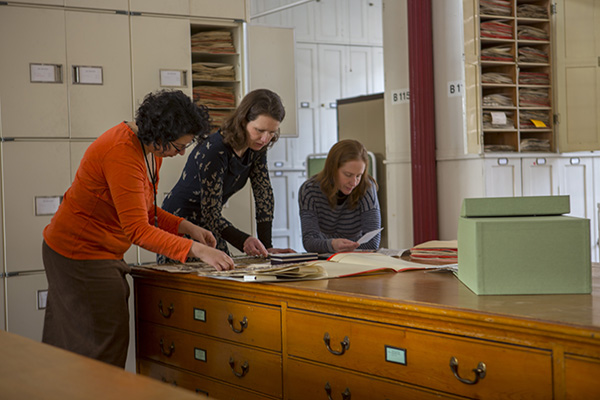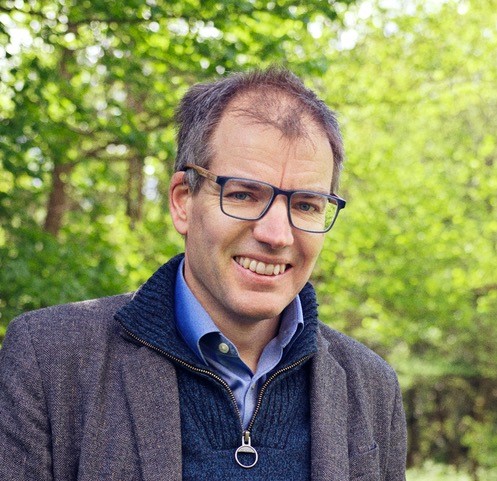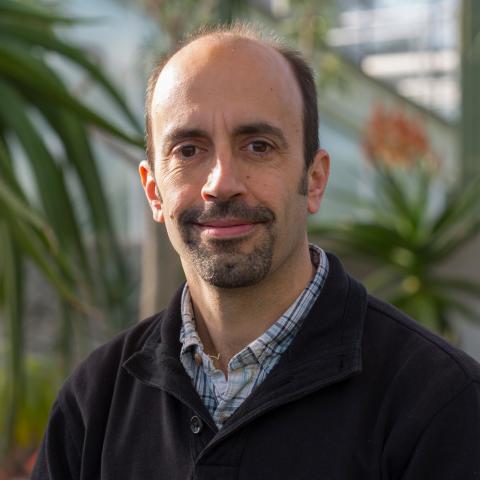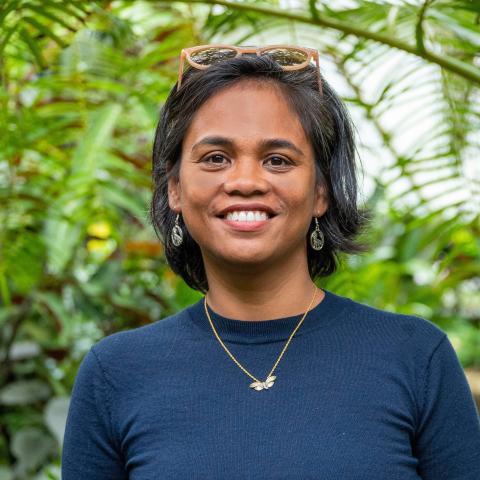Study options
- Starting in
- September 2025
- Location
- QMUL and Kew Gardens
- Fees
- Home: £16,500
Overseas: £29,950
EU/EEA/Swiss students
What you'll study
MSc Plant and Fungal Taxonomy, Diversity and Conservation at Queen Mary will give you the cross-disciplinary skills and knowledge you need to describe, understand and conserve biodiversity. The course will teach you plant and fungal identification skills, molecular systematics, evolutionary biology, as well as conservation policy, theory and practice.
You’ll be taught by world-leading experts, internationally recognised for their cutting-edge research in plant and fungal sciences. You’ll learn how to apply new technologies to answer fundamental questions about the diversity of plant and fungal life on Earth, how it evolved and how we can best conserve it.
In this programme you’ll visit conservation projects and experience rare exotic plants during a field trip to Madagascar. You’ll get an introduction to practical field work, including botanical surveys and flowering plant identification and how they can be applied to solving practical problems of conservation management as well as biodiversity research. It will be taught by botanists from the Royal Botanic Gardens Kew, the Kew Madagascar Conservation Centre (KMCC) in Antananarivo and local conservationists and researchers from collaborating institutions. Several site visits to conservation projects and some taught case studies will give an overview of conservation in Madagascar.
Structure
- Six compulsory taught modules
- Substantive six-month research project
Module videos
Compulsory/Core modules
This module involves a novel piece of research, typically combining field sampling or use of Kew's biological collections, experimentation, laboratory work, and data analysis. Students can benefit from close alignment with current PhD or Post Doctoral research within specific research groups, both at QMUL and in RBG Kew. The diversity of expertise of lecturers involved with the programme means that high quality supervision can be found for a broad range of studies in plant and fungal biology, ecology and evolution.
This module will provide an overview of global plant diversity, with a particular focus on flowering plants. It will be taught at the Royal Botanic Gardens, Kew by leading botanists, affording students the opportunity to explore the outstanding collections and facilities housed there. Topics will range from taxonomic principles and methodology, plant systematics and comparative biology (including morphology, chemistry and genomics), phylogenetics, biogeography and evolution. The module will have a practical component, providing excellent hands-on experience for students.
This module will focus on fungal diversity and it will be taught at RBG, Kew by leading mycologists. Kew has the largest collection of fungal specimens in the world that will be available to the students during the course. The module will give an overview of the systematics and taxonomy of major fungal groups, of basic concepts in mycology, field collecting, and culturing and fungarium techniques. In addition, front-line research on the ecology of fungi (e.g., symbiosis, 'rotters and recyclers', pathogens), fungal biogeography, and fungal evolutionary genomics, will be explored through study of contemporary research. The module will have a practical component, providing excellent hands-on experience for students.
This core module will introduce you to cutting-edge topics in biodiversity, evolution and conservation. In a series of interactive lectures and workshops, you will be taught by leading experts on the latest scientific advances in their respective fields. You will conduct a critical review on a subject of your choice, with potential topics covering marine and terrestrial species and ecosystems, evolution, and conservation. The module is designed to develop skills in critical thinking and scientific writing, and offers a firm foundation for the MSc programme. This core module is taught at Queen Mary University of London.
This module aims to provide a strong foundation in data analysis, visualisation and interpretation¿all critical skills in modern biodiversity and conservation science. You will be taught experimental design, statistical analysis (incl. ANOVA, correlation and regression), and basic bioinformatics analyses. Teaching in this module uses the software R, and typically comprises formal instruction in the mornings followed by practical sessions in the afternoons, in which you will gain hands-on experience of analysing real-world datasets. This core module is taught at Queen Mary University of London.
The module will provide an introduction to practical field work, including botanical surveys and flowering plant identification, field mycology, and how these can be applied to solving practical problems of conservation management as well as biodiversity research. It will be taught by botanists and mycologists from the Royal Botanic Gardens Kew and local conservationists and researchers from collaborating institutions. Study visits to biodiversity rich sites, conservation projects and some taught case studies will give an overview of the conservation management at the study site. Usually, the field skills module of the MSc in Plant and Fungal Taxonomy, Diversity and Conservation takes place in Madagascar. However, we reserve the right to change the location of this course if advice on travel from the Foreign Commonwealth Office changes, or for logistical reasons. For students unable to travel to the course location, an alternative method of assessment will be undertaken.
Here you will learn how to work with genetic, geographical and biodiversity record data and how to draw conclusions about species distributions, status, and potential conservation approaches. There are three blocks of training: The survey and spatial analysis block teaches the main approaches to vegetation surveying and securing good quality data on which to base analysis of species distribution and status. Assessment will include production of a species distribution map. The conservation genetics block provides an introduction to theory and practice, and examines through case studies of plant and fungal diversity how genetic diversity information can inform conservation decisions. Conclusions are discussed in a group session. The final red-listing block provides training in the requirements for assessing extinction threat in plant and fungal species. The assessment includes preparing a conservation report and a preliminary red list assessment for one species. This is a professional competency using IUCN endorsed materials and approaches. This elective module is taught at the Royal Botanical Gardens, Kew.
Assessment
- 50% Modules
- 50% Research project
Research project
You will have a chance to conduct in-depth independent research on a topic that is of interest to you and your career goals. You’ll be given a list of potential projects, as well as the opportunity to develop your own projects in agreement with supervisors. Recent projects include:
- Origin and evolution of the hyper diverse flora of the Choco biogeographic region in Tropical America
- Molecular and Morphological investigation of waxcap diversity
- Monographing and conserving the palms of New Guinea
Teaching
This course has been developed and is taught by practising professionals and industry experts. In addition to attending a series of lectures from academics, you’ll develop highly sought-after practical skills through field trips and hands-on training and gain invaluable insight from guest speakers.
You will be expected to complete further hours of independent study. You’ll take an active role in your own learning by reading designated material, producing written assignments and completing projects.
To help you along your journey, you’ll also be assigned an Academic Adviser who will guide and support you in both academic and pastoral matters throughout your course.
—The course was overall really well taught. Some of the modules I found particularly interesting were statistics at Queen Mary, introduction to plant and fungal taxonomy at RBG Kew, the hands-on field trip to Madagascar where we made our own plant and fungal collections, and the immersive six-month independent research module. Lecturers are always experts in their fields and were keen to answer just about any question I managed to come up with.
Peter Petoe – Plant and Fungal Taxonomy, Diversity and Conservation MSc 2017, now PhD student in Palm Evolution and Biodiversity at Aarhus University, Denmark, and Royal Botanic Gardens, Kew
Where you'll learn
Facilities
At Queen Mary and Royal Botanical Gardens, Kew you'll have access to a number of advanced facilities:
- At Queen Mary, you will have access to laboratories that house state-of-the-art equipment for processing environmental and genetic samples, including mass spectrometry platforms for stable isotope analysis.
- At Kew, world-class resources include the Herbarium, Fungarium, Economic Botany Collection, Library, Millennium Seed Bank, Jodrell Laboratories, and the Living Collection that encompass gardens, glasshouses & nurseries at Kew and Wakehurst.
- Specialist analytical research facilities within our Centre for the Aquatic and Terrestrial Environment.
- Mesocosm and temperature-controlled facilities at Queen Mary
- The Genomics Facility, which houses equipment for high-throughput sequencing.
- Network of partner NGOs, research labs and industries.
Campus
Mile End campus
You will undertake two modules at Queen Mary’s Mile End campus in exciting east London. Mile End is the heart of our lively student community. Here you’ll be able to study and socialise with students and staff from over 160 countries around the world.
Royal Botanic Gardens, Kew
You will study three modules at Royal Botanic Gardens, Kew. At Kew, you’ll experience first-hand the largest collections of living and preserved plants in Europe. You’ll also have the chance to rub shoulders with their team of over 350 highly-skilled scientists, curators and technicians.
Accommodation
Kew Gardens is one hour by underground train from Queen Mary University of London, with a service scheduled to run every 10 minutes, meaning that movement between the two sites is easy. Teaching occurs in both places. Nevertheless, students on this programme usually find it is most convenient to find accommodation around Kew, because that is where you will typically do your Master’s project. To help you in finding accommodation around Kew, please contact Dr Cheung Tang (c.tang@kew.org) for further information. It is also fine to take accommodation around Queen Mary and if you need help in finding accommodation there, then please contact housingservices@qmul.ac.uk.

About the School
School of Biological and Behavioural Sciences
The School of Biological and Behavioural Sciences is one of the UK’s leading research departments, with a multi-disciplinary approach to teaching and research. We are a large and dynamic school with strong links with industry, offering students a stimulating and supportive learning experience.
Queen Mary University is also part of the Russell Group - a body of leading UK universities dedicated to research and teaching excellence.
We also collaborate with the School of Geography on the Centre for the Aquatic Terrestrial Environment (CATE). The facilities of which, some students can access for specific projects or modules.
Career paths
This course gives you the knowledge and skills to undertake research in the fields of taxonomy, molecular systematics, ecology and evolution, or to engage in more applied conservation work. It’s ideal preparation for a PhD or a career in industry, academia, environmental consultancy or government agencies.
Graduates of this course go on to roles such as:
- PHD Candidate at The James Hutton Institute
- Botanical Horticulturalist at Royal Botanic Gardens, Kew,
- Plant Science Content Editor at Centre for Agriculture and Bioscience International
- PHSI Plant Health Import Inspector at Animal and Plant Health Agency
You'll have access to our Careers and Enterprise service who'll be there to help you find the right opportunity for your next step.
- 100% of our postgraduate taught students are in employment or further study within six months of graduating (HESA GOS, 2022).
- 78% of SBBS QMUL graduates in work are in highly skilled employment (HESA GOS, 2021/22).
- £25,600 The average UK salary 15 months after graduating for our postgraduates (HESA GOS, 2021/22).
Fees and funding
Full-time study
September 2025 | 1 year
- Home: £16,500
- Overseas: £29,950
EU/EEA/Swiss students
Unconditional deposit
Home: £1000
Overseas: £2000
Information about deposits
Queen Mary alumni can get a £1000, 10% or 20% discount on their fees depending on the programme of study. Find out more about the Alumni Loyalty Award
Funding
There are a number of ways you can fund your postgraduate degree.
- Scholarships and bursaries
- Postgraduate loans (UK students)
- Country-specific scholarships for international students
Our Advice and Counselling service offers specialist support on financial issues, which you can access as soon as you apply for a place at Queen Mary. Before you apply, you can access our funding guides and advice on managing your money:
Entry requirements
UK
Degree requirements
A 2:1 or above at undergraduate level in Biology or a relevant natural sciences subject.
Other routes
Applicants with a good 2:2 degree (55% or above) will be considered on an individual basis, provided they can demonstrate substantial experience in a relevant field.
Find out more about how to apply for our postgraduate taught courses.
International
English language requirements
The English language requirements for our programmes are indicated by English bands, and therefore the specific test and score acceptable is based on the band assigned to the academic department within which your chosen course of study is administered. Note that for some academic departments there are programmes with non-standard English language requirements.
The English Language requirements for entry to postgraduate taught and research programmes in the School of Biological and Behavioural Sciences falls within the following English band:
Band 4: IELTS (Academic) minimum score 6.5 overall with 6.0 in each of Writing, Listening, Reading and Speaking
Please note, there are some postgraduate programmes with non-standard English language requirements in this School.
We accept a range of English tests and qualifications categorised in our English bands for you to demonstrate your level of English Language proficiency. See all accepted English tests that we deem equivalent to these IELTS scores.
Visas and immigration
Find out how to apply for a student visa.






